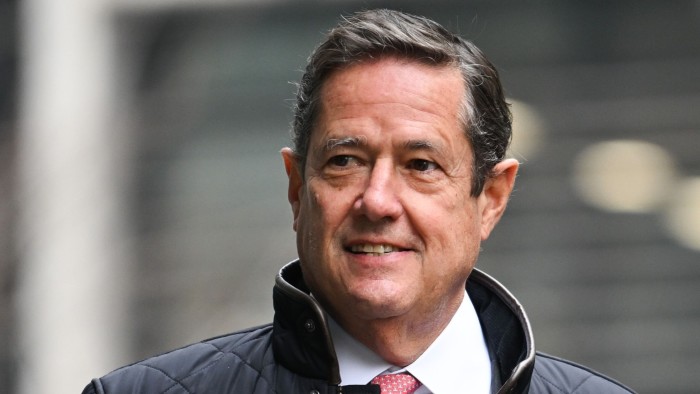Unlock the Editor’s Digest for free
Roula Khalaf, Editor of the FT, selects her favourite stories in this weekly newsletter.
Former Barclays chief Jes Staley accused UK regulators on Monday of “destroying” his reputation by fining and banning him from senior roles in the financial industry over his ties to the late sex offender Jeffrey Epstein.
Staley, 68, made the claim in a London court as he sought to overturn the penalties imposed on him in 2023 by the Financial Conduct Authority for allowing Barclays to mislead the regulator about the nature of his dealings with Epstein.
His testimony came after Barclays’ chair Nigel Higgins told the court earlier in the day that he had “a different picture” of Staley and Epstein’s relationship based on the information now available to him. Higgins said he had previously believed that the relationship was “essentially business-related”.
The case, which is being held in the Upper Tribunal, centres on two statements Barclays made in a letter in 2019 — which Staley approved — that the chief executive “did not have a close relationship” with Epstein and that his last contact with him was “well before” Staley had joined the UK bank in 2015.
The FCA contends that a cache of emails between the two show that the statements in Barclays’ letter were inaccurate.
Staley said: “The FCA took the most serious and drastic step that it could, ending my long and distinguished career in financial services and destroying my reputation without first asking me for an explanation for any perceived discrepancy” between the letter and the emails.
“It has become clear to me . . . that the [Prudential Regulation Authority] and the FCA prejudged the investigation,” he said. “I consider that the FCA’s case against me lacks objectivity and does not bear logical scrutiny.”
Staley took to the witness stand on Monday shortly after Higgins, who told the court that Barclays would have questioned Staley more thoroughly about his relationship with Epstein if it knew then what it knows now.
In his witness statement, Higgins said: “I had understood that the relationship between [Staley] and Mr Epstein was essentially business related.”
However, he added: “The information of which I am now aware paints a different picture in my mind as to the nature of the relationship.”
“Had my colleagues at Barclays and I been aware of all of the information of which I am now aware, I am sure that we would have questioned Mr Staley about that further information in depth.
“At this distance, and without the benefit of discussing this information with Mr Staley and other colleagues, I cannot be certain what we would have concluded.”
In a 2021 interview with regulators, Higgins had explained “affectionate” messages Staley sent to Epstein as being “the way he writes” to “lots of people”, the court heard on Monday.
Staley, in his witness statement, defended his business ties with Epstein, pointing to his connections with a long list of influential figures including former US president Bill Clinton, ex-Apollo Global Management chief executive Leon Black and former US Treasury secretary Lawrence Summers, and described him as a “valuable” contact to cultivate.
But he insisted it was a “professional relationship” that “was predicated upon business”, disputing the FCA’s characterisation of their connection as “close”.
“We were not personal friends,” he said in his witness statement.
Staley said that as far as he could recall, his last meeting with Epstein was in April 2015, when he and his wife visited Epstein’s island for a few hours during a sailing holiday. The phrase in the letter “well before” referred to this, he said.
Staley said his last email exchange was on 25 October 2015, and that his last phone call was a few days later, when he told Epstein that there would be no further communication.
While the FCA has argued that contact continued thereafter via his daughter, Staley does not accept that this constituted contact. He said he has “no recollection of having had any discussion with my daughter concerning this correspondence”.
Staley argues that it was flawed for the authority simply to compare the content of the emails between the two with Barclays’ letter to the FCA, whose real purpose was not to provide an all-encompassing account of the pair’s relationship but simply to assure the FCA that neither Staley nor Barclays knew of or were involved in Epstein’s criminal conduct.
“I have never attempted to conceal my relationship with Jeffrey Epstein,” Staley added. “If I had known it was to be found that he was a prolific sex offender, I would not have had a relationship with him at all.”
The case continues.
This article has been amended to reflect that the case is taking place in the Upper Tribunal and not the High Court



